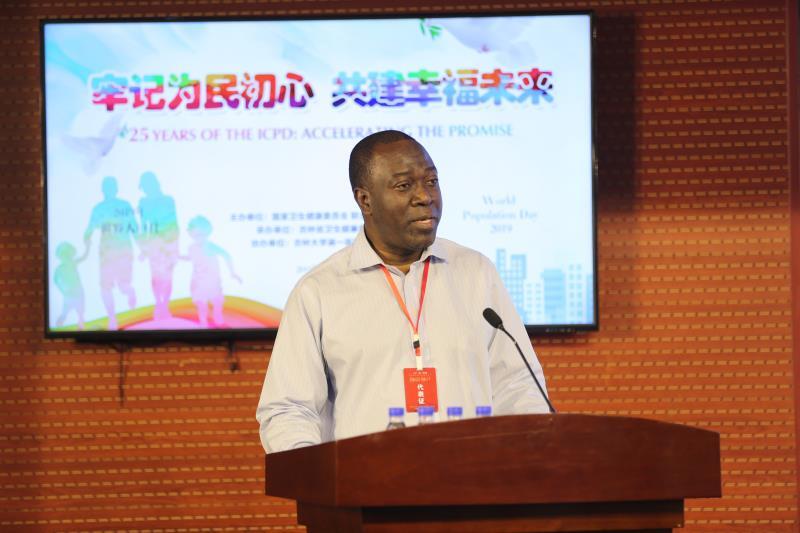July 4 2019, Changchun City, Jilin Province
On behalf of the United Nations Population Fund, I would like to express my sincere thanks to the National Health Commission and the Changchun Municipality for organizing the event and inviting UNFPA to participate in the commemoration of the World Population Day.
Each year since 1990, UNFPA offices, host governments and communities have observed World Population Day and raised awareness of important population and development issues. The year 2019 marks three milestones: the 50th anniversary of the establishment of UNFPA, the 40th anniversary of UNFPA’s presence in China, and the 25th anniversary of the Program of Action of the ICPD held at Cairo in 1994. The global theme for Year 2019’s World Population Day, is “25 years of the ICPD: accelerating the promise”. The national theme – “Remain true to our original aspiration of people-centered, working for building a better future” aligns well with the main thrust of the ICPD Program of Action.
At the ICPD in Cairo, the needs and aspirations of human beings were put at the centre of sustainable development. The 179 governments adopted the visionary Programme of Action and agreed that putting people first, empowering women, and enabling people to freely decide the timing and spacing of their pregnancies would clear the way to sustainable development.
The gains made since then are remarkable:
- In 1994, only about 15 per cent of married women in the least developed countries used a modern contraceptive. Today, 37 per cent do.
- Twenty-five years ago in the least-developed countries, nearly eight in 1,000 women died during pregnancy or childbirth. Today, that rate has been cut in half.
- A woman in a least-developed country 25 years ago had nearly six children. Today she has fewer than four.
Despite this success, the world still has a long way to go before we can claim to have lived up to the commitments pledged in Cairo. Three strategic results that remain to be achieved by 2030 are: zero unmet need for family planning; zero preventable maternal deaths; and zero violence and harmful practices against women and girls, including child marriage and female genital mutilation. By achieving the “Three Zeros”, by harnessing the demographic dividend, and by building inclusive and just societies, UNFPA and all partners will be contributing to a world that leaves no one behind, where young people can live healthy and productive lives, where older people and people with disabilities feel included and valued in their communities, where stigmatization and discrimination have no place, and where sexual and reproductive health and reproductive rights are promoted, respected and protected. And the target year is 2030, the year for achieving the Sustainable Development Goals (SDGs).
A global summit on ICPD + 25 is to be held in Nairobi, Kenya in November 2019. Heads of state and ministers including those of China, parliamentarians, thought-leaders, technical experts, civil society organizations, young people, business and community leaders, faith-based organizations, international financial institutions, academics and thousands of others interested in the pursuit of reproductive health and rights will come together with a common purpose: to commit to finally implementing the full ICPD Programme of Action.
In 1978, China started its reform and opening up to the outside world. Since then, it has rapidly developed into the world’s second largest economy and improved the well-being of its 1.4 billion citizens in terms of reduced poverty, increased life expectancy, and higher educational attainments, amongst other human development indicators. UNFPA is proud of its fruitful cooperation with China since 1979 and of the contribution it made to China’s social and economic development.
The UNFPA/China country programmes prior to the ICPD focused on strengthening the nation’s capacity to collect and use population data and on supporting the manufacture of safe and modern contraceptives. With the support of UNFPA, China conducted its first modern census in 1982. Also, a UNFPA-led project in 305 counties for integrating voluntary family planning into MCH laid a foundation for a nationwide programme for reducing maternal deaths.
Since the ICPD in 1994, UNFPA began to advocate for China to adopt social, economic and health policies that advance universal access to sexual and reproductive health and rights especially for women and youth in line with the Cairo Programme of Action. In this period, UNFPA has been a supportive witness to the gradual transition of China’s family planning programme from an emphasis on demographic targets towards client-centered approaches based on informed choice for family planning, reproductive and maternal health and sexual health services. In this regard, the fertility policy adjustment effective in 2016 marked a forward step toward realization of universal access to reproductive health and rights.
As we mark the 25th anniversary of ICPD, UNFPA is pleased to collaborate with the National Health Commission, a long-standing partner of UNFPA and other national partners, to review the ICPD journey in China since 1994. From this review, a clear outline of the unfinished business in China of the Programme of Action to ensure that all women and men, girls and boys, enjoy the dignity and human rights to expand their capabilities, and secure their reproductive well-being will be established. This outline will largely guide our partnership as we go forward in our common quest to contribute to inclusive and equitable social and economic development in China.
Thank you.


